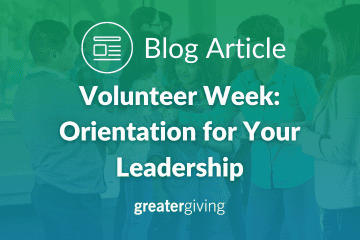
Celebrate and Empower: Volunteer Orientation for Your Board and Committees during Volunteer Week
This Volunteer Week, let’s not only celebrate the incredible impact volunteers have on our organizations, but also empower our Board members and event committee members to be champions for volunteer engagement.
Why is Volunteer Orientation Important for Leadership?
A strong volunteer program is the backbone of many nonprofits. Board members and event committee members often have a significant influence on strategic planning and resource allocation. Equipping them with volunteer orientation knowledge ensures they understand the value proposition of volunteers and can champion:
- Effective Volunteer Recruitment: Board members and committee members can leverage their networks to attract skilled volunteers.
- Meaningful Volunteer Roles: By understanding volunteer skill sets and motivations, leadership can advocate for the creation of impactful volunteer roles.
- Volunteer Retention: Positive volunteer experiences lead to long-term engagement. Leadership can champion practices like clear communication, appreciation, and growth opportunities to retain volunteers.
What to Include in Your Volunteer Orientation for Board and Committees
The Power of Volunteers
Highlight the impact volunteers have on your organization’s mission and showcase success stories. A great way to do this is by keeping track of you volunteer hours and using Points of Light’s Value of a volunteer hour resource to show how much volunteer efforts have saved your organization in terms of dollars.
Volunteer Demographics and Motivations
Understanding who your volunteers are and why they volunteer helps tailor engagement strategies. A great way to do this is with a survey that asks them about themselves, their background, and the ways they would feel most fulfilled and valued.
Volunteer Recruitment Strategies
Equip leadership with knowledge of effective recruitment methods and resources. They need to know what to do or how to refer someone they know that would like to volunteer with your organization.
Volunteer Management Best Practices
Cover topics like onboarding, training, communication, appreciation, and recognition programs.
Engaging with Volunteers during Events
Guide board members and committee members on how to interact with volunteers during events to ensure a positive experience. Examples include who is in charge of volunteers at events, and how to thank volunteers for their service.
Make it a Collaborative Learning Experience
Instead of a traditional lecture, consider an interactive workshop format. This allows for open discussion, brainstorming, and knowledge sharing. Invite experienced volunteers to share their perspectives and answer questions.
Beyond Volunteer Week: Ongoing Championing
Volunteer Week is a great starting point, but advocating for volunteers should be an ongoing effort. Encourage board members and committee members to:
- Become Volunteer Ambassadors: They can speak at events, write testimonials, and highlight volunteer stories on social media.
- Mentor New Volunteers: Offer guidance and support to new volunteers to ensure a smooth onboarding experience.
- Recognize Volunteer Achievements: Publicly acknowledge volunteer contributions during board meetings, events, and newsletters.
By empowering our leadership to become champions for volunteer engagement, we can build a stronger foundation for volunteerism within our organizations. This, in turn, allows us to create a more impactful and sustainable model for achieving our missions.
